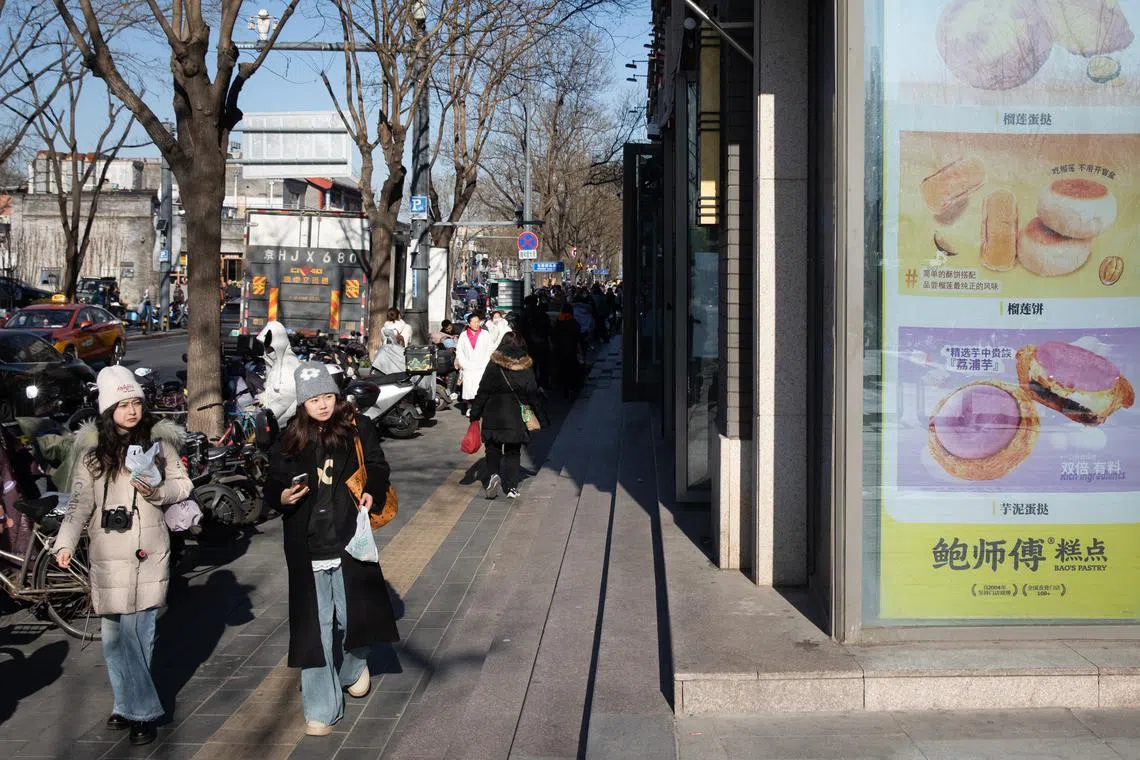China to issue more debt, boost consumption in 2025
Sign up now: Get insights on Asia's fast-moving developments

China's pro-growth message is the latest in a series of signals that it will ramp up support for an economy that faces growing external headwinds.
PHOTO: EPA-EFE
SHENZHEN – China will allow more government spending and step up efforts to get its people to spend more in a bid to boost its economy in 2025, as the prospect of a heightened trade war with the US looms.
The country will increase its budget deficit, issue more bonds and cut interest rates, state media reported as the nation’s leaders concluded an annual meeting on Dec 12 to set the economic agenda for the year ahead.
The meeting also listed, at the top of policymakers’ tasks for 2025, the need to “vigorously boost consumption”, according to a readout from national broadcaster CCTV on the Central Economic Work Conference held in Beijing from Dec 11 to 12.
The task of boosting consumption was listed second in 2024, behind innovation in science and technology.
“Policymakers see boosting domestic demand, especially household consumption, as the top policy priority for 2025,” said economist Larry Hu from financial services group Macquarie. “To achieve this, (they) will leverage up the central government to boost fiscal spending.”
The meeting, attended by senior party and government officials, including President Xi Jinping, said China should maintain stable growth, employment and prices in the year ahead, while helping people’s incomes grow in step with the economy.
Its pro-growth message is the latest in a series of signals that China will ramp up support for an economy that faces growing external headwinds.
While the readout expressed confidence in the country’s trajectory and said it is on track to fulfil its economic targets this year, it also acknowledged that “the unfavourable impact of changes in the external environment has deepened, and the running of China’s economy still faces many difficulties and challenges”.
China’s outlook on trade – a bright spot and key growth driver amid depressed domestic demand – is clouded by the prospect of a stiffer trade war following President-elect Donald Trump’s return to the White House in January.
He has pledged to impose additional 10 per cent tariffs on Chinese imports
Against this backdrop, boosting domestic demand has become an even more pressing priority.
The country has to “vigorously boost consumption” and “expand domestic demand in all respects”, the meeting noted.
Policymakers are to take special measures to spur consumption, step up existing programmes, including one that incentivises upgrades of consumer goods and industrial equipment, and promote investment through government spending, it added.
The meeting also echoed a call on Dec 9 by the Politburo, a 24-man grouping of top party leaders, for “more proactive” fiscal policy and “moderately loose” monetary policy
“I think the shift of policy this week is clearly more significant than that (which) took place in the last week of September,” said economist Zhang Zhiwei, referring to an earlier Politburo meeting and an accompanying spate of stimulus measures.
“The direction of policies is clear but the size of stimulus matters,” added the president and chief economist of Pinpoint Asset Management.
The Central Economic Work Conference did not shed light on how large a stimulus package China would roll out. Nor did it specify what the nation’s growth target for 2025 would be – this is typically revealed at the annual parliamentary meetings, or Two Sessions, in March.
Mr Hu assessed that China’s policymakers would do just enough to meet the growth target, but not more.
“As a result, how much they will do in 2025 will depend on two things: their GDP growth target and the new US tariffs,” he said.



